anxiety & aggression support
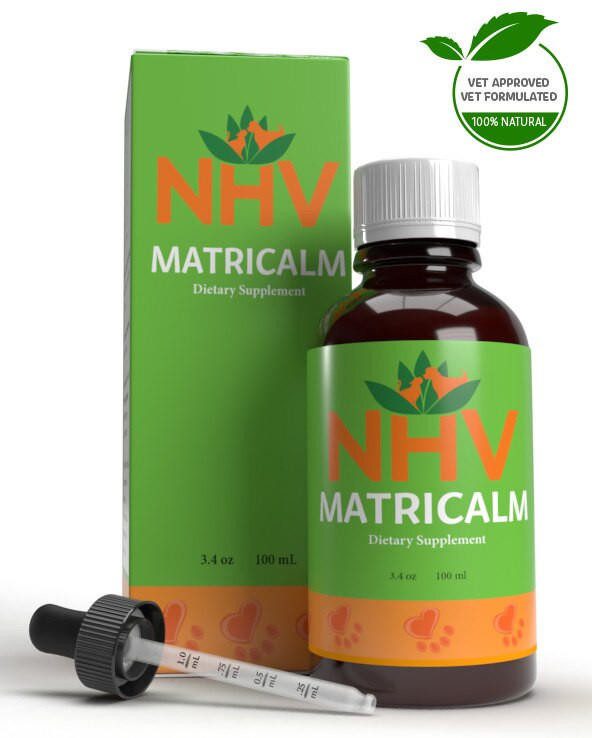
free shipping over $100 (USA & Canada)
1-877-937-4372 the pet expert hotline
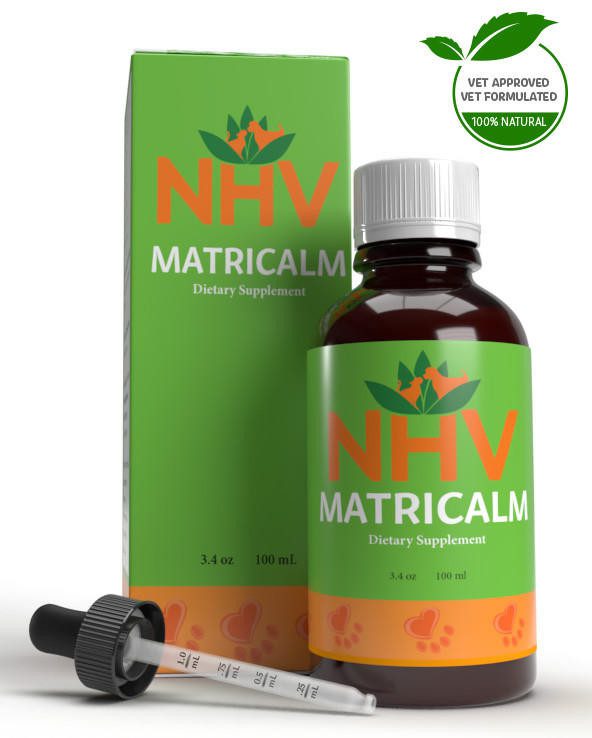
Natural Help for Stress Reduction, Anxiety Relief, Behavioral Problems, and Aggression in Cats

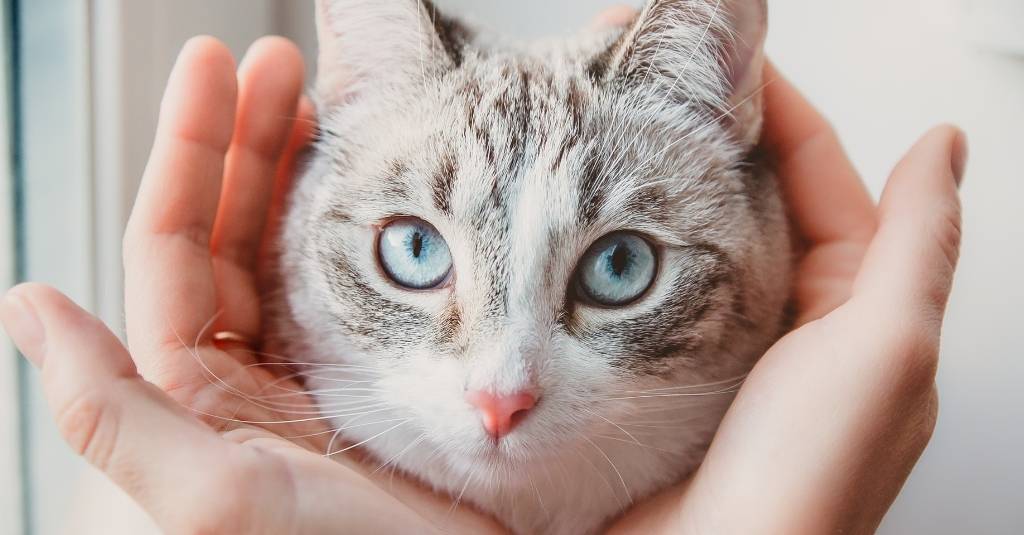
Much like us humans, our pets can experience anxiety and stress as well! Felines are very intuitive and sensitive beings, and due to this can indeed experience anxiety, stress, and depression. Cat anxiety may be fear-based, due to pain/discomfort, triggered by a recent environmental/life change, and much more. Each pet can experience anxiety due to different triggers and each little one may have their own unique output associated with this anxiety. Not every kitty will be the same when it comes to anxiety!
Again, each cat will display different signs of anxiety. But some of the common signs of anxiety are as follows:
We first want to rule out any underlying health concerns which may be the root of the anxiety.
Anxiety may have different underlying reasons, and each furbaby will be uniquely different. We would first recommend having a local vet rule out any health concerns. Since our furbabies cannot verbally tell us if they are not feeling well, we first want to rule out any underlying health concerns, which may be the root of the anxiety. If our little one is not feeling well, it may cause them to be anxious.
With all underlying health concerns ruled out, it’s best to look further into the root of the anxiety. Some felines are very sensitive to any change and may experience anxiety due to such a change. For example, something as minute as a change in litter brand may cause anxiety in a little one. Or a drastic change such as a big move and/or new furniture!
Much like us humans, our little ones may have fear-based triggers. For example, if your furbaby had a scary encounter with another feline, in the past, they may have fear-based anxiety associated with feline interactions. So if this fear-based trigger presents itself your little one may have outputs of anxiety.
Yes, studies have shown that pets are very much attuned to their human family members! So if we are feeling anxious or depressed, they can sense this. Some cats can also pick up on the emotions of humans they don’t know. For example, if you take your little one to the vet and another person at the clinic is experiencing anxiety and/or depression, your furbaby can pick up on this.
We recommend addressing anxiety in your little one with your local vet. First, they will rule in or out any underlying health concerns. With health conditions ruled out, the next step is to investigate the root of the matter further. It is important to address your pet’s anxiety as both mental and physical health is important for our little ones’ well-being.
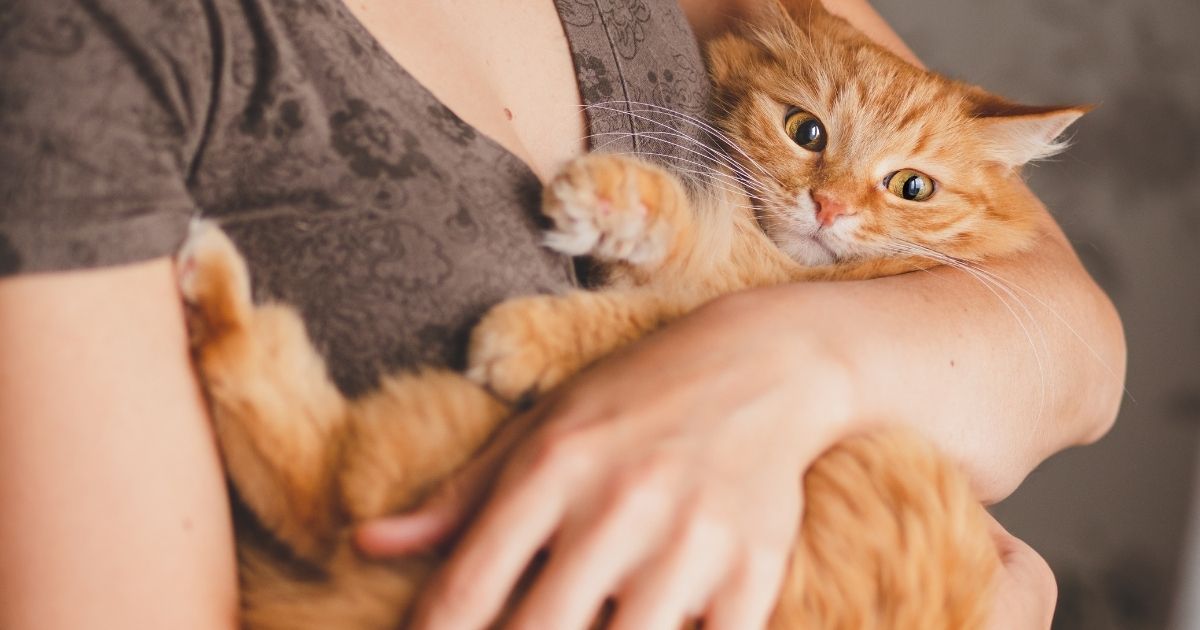
Yes, for example, if an anxious furbaby displays urinary issues when stressed this can lead to kidney, bladder, and/or urinary tract health. Both humans and pets may experience cardiovascular issues, such as high blood pressure with anxiety. Essentially, if left untreated, anxiety and depression in furbabies can lead to future health concerns.
If the anxiety is due to an underlying medical condition, addressing the medical condition can provide our furbabies with relief regarding their medical/pain-based stress. If the anxiety is due to life/environmental changes, it’s best to make some adjustments to help them feel more comfortable. For example, if the litter brand was recently changed, going back to the previous litter brand may help.
A pet parent may also wish to utilize additional aids. Things like training, calming pheromone sprays/outlets (found at your local vet or pet store), and all-natural supplements. NHV’s Matricalm is an all-natural supplement, which may aid in reducing the stress and anxiety your little one is facing. This supplement works best alongside your vet’s treatment plan (whether this is medications, training tips, or a combination of both).
We recommend our Matricalm supplement as an additional aid for addressing stress and anxiety in a kitty. Extracts such as chamomile and lemon balm have historically been shown to naturally help reduce stress and anxiety. Passionflower, valerian, and hops extracts contain properties that promote relaxation. For best results, we recommend utilizing our Matricalm supplement alongside your vet’s treatment plan which may include training techniques and/or veterinary medications.
If your little one is experiencing anxiety or stress due to a specific medical condition, please reach out to our Pet Experts by clicking on the button below, and they will be more than happy to help guide you on additional tips.
anxiety & aggression support

All-Natural Supplements for Parrots, Budgies and Other Birds
buy 2 and save $3
3 month supply for a small to medium size pet
Whether you have a cockatoo, a budgie, canary, or any kind of parrot, birds are very sensitive creatures and may be prone to stress. NHV Matricalm is formulated to help calm your bird’s nerves and help increase their body’s resistance to stress and disease.

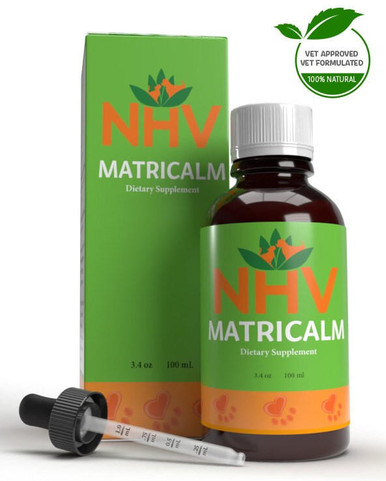
Whether you have a cockatoo, a budgie, canary, or any kind of parrot, birds are very sensitive creatures and may be prone to stress. NHV Matricalm is formulated to help calm your bird’s nerves and help increase their body’s resistance to stress and disease.

Many pet birds are extremely intelligent and sensitive, so with the addition of other birds, loud sounds, loneliness or lack of stimulation, your bird may become stressed out, especially birds like Cockatoos, African Grays, and other species of parrots. Their heart rate and blood pressure may increase, and they may become irritated, excitable, and display behavior like feather picking, or screaming. Matricalm contains five calming herbs that help to reduce anxiety, increase feelings of relaxation and discourage behavioral issues related to a stressed-out nervous system.
Our all-natural care products are palatable for all types of birds, and their liquid formulations make them easy to hide in a favorite treat or daily meals.
Stress and anxiety may have detrimental effects on your bird's body and cause a lot of discomfort. Ingredients like chamomile and lemon balm can help calm excitability, nervousness and relieve discomfort. The sedative properties in Matricalm help to expel intestinal gas and help lower blood pressure to support feelings of calmness. Herbs like passion flower promote feelings of relaxation by increasing levels of gamma aminobutyric acid (GABA) in the brain, while valerian helps to improve sleep latency and sleep quality. Hops adds diuretic and sedative support to help relieve sleep disturbances and improve mood.
Formulated specifically for pets and pocket pets by a holistic vet and master herbalist with more than 20 years of experience! If you have any questions about bird health or stress-related behavior, Get in touch with an NHV Pet Expert - we’re always happy to help.
Made with the finest, organically grown, or ethically harvested herbs. Made specifically for pets, vet-formulated, and vet approved.
Matricalm
For birds: 1 drop per two pounds twice a day
How to Administer
Shake well before use. The easiest method is to use the dropper provide and place the drops into your bird's favorite treat. You can also use the dropper and squirt directly into the bird’s mouth.
For Best Results
Herbal dietary supplements are beneficial to the health and wellbeing of your pet and are safe for long-term use. Every pet responds to natural herbal supplements differently, therefore it is important to be consistent and administer the product daily. Supplements generally take two to four weeks to take effect, however this will vary from one animal to the next.
Product Storage
All NHV Natural Pet Products are pure herbal extracts and contain no artificial additives, preservatives or coloring. Shelf life after opening is 6 months and must be refrigerated after opening.
Cautions and Contraindications
Do not use Matricalm in pregnant or nursing animals. Speak to your vet before using our products. A second visit is recommended if your pet’s condition does not improve, or deteriorates after continued use of the supplements.
All information provided by NHV Natural Pet Products is for educational purposes only.
Many pet birds are extremely intelligent and sensitive, so with the addition of other birds, loud sounds, loneliness or lack of stimulation, your bird may become stressed out, especially birds like Cockatoos, African Grays, and other species of parrots. Their heart rate and blood pressure may increase, and they may become irritated, excitable, and display behavior like feather picking, or screaming. Matricalm contains five calming herbs that help to reduce anxiety, increase feelings of relaxation and discourage behavioral issues related to a stressed-out nervous system.
Our all-natural care products are palatable for all types of birds, and their liquid formulations make them easy to hide in a favorite treat or daily meals.
Stress and anxiety may have detrimental effects on your bird's body and cause a lot of discomfort. Ingredients like chamomile and lemon balm can help calm excitability, nervousness and relieve discomfort. The sedative properties in Matricalm help to expel intestinal gas and help lower blood pressure to support feelings of calmness. Herbs like passion flower promote feelings of relaxation by increasing levels of gamma aminobutyric acid (GABA) in the brain, while valerian helps to improve sleep latency and sleep quality. Hops adds diuretic and sedative support to help relieve sleep disturbances and improve mood.
Formulated specifically for pets and pocket pets by a holistic vet and master herbalist with more than 20 years of experience! If you have any questions about bird health or stress-related behavior, Get in touch with an NHV Pet Expert - we’re always happy to help.
Made with the finest, organically grown, or ethically harvested herbs. Made specifically for pets, vet-formulated, and vet approved.
Matricalm
For birds: 1 drop per two pounds twice a day
How to Administer
Shake well before use. The easiest method is to use the dropper provide and place the drops into your bird's favorite treat. You can also use the dropper and squirt directly into the bird’s mouth.
For Best Results
Herbal dietary supplements are beneficial to the health and wellbeing of your pet and are safe for long-term use. Every pet responds to natural herbal supplements differently, therefore it is important to be consistent and administer the product daily. Supplements generally take two to four weeks to take effect, however this will vary from one animal to the next.
Product Storage
All NHV Natural Pet Products are pure herbal extracts and contain no artificial additives, preservatives or coloring. Shelf life after opening is 6 months and must be refrigerated after opening.
Cautions and Contraindications
Do not use Matricalm in pregnant or nursing animals. Speak to your vet before using our products. A second visit is recommended if your pet’s condition does not improve, or deteriorates after continued use of the supplements.
All information provided by NHV Natural Pet Products is for educational purposes only.
stress & anxiety support
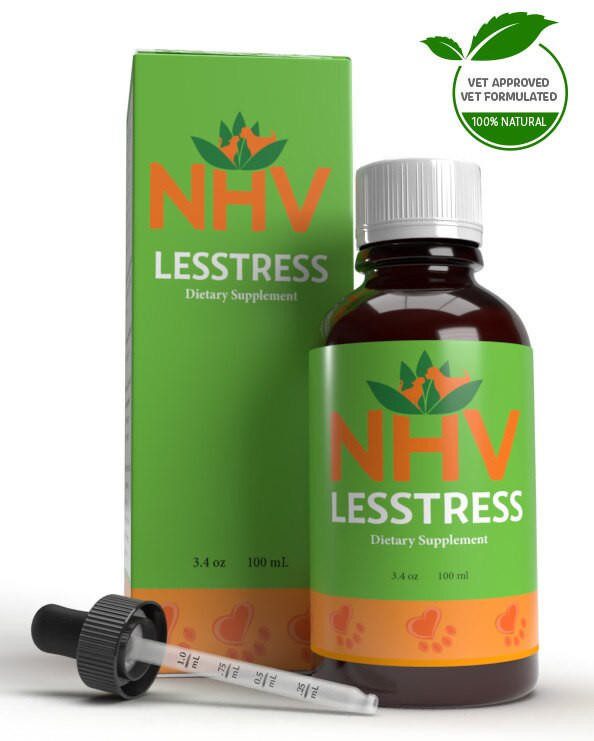
Natural Support for Canine Stress and Anxiety
buy 2 and save $3
3 month supply for a small to medium size pet
Everyone knows what stress feels like, and we all know that too much stress can make us ill—high blood pressure, ulcers and even cancer can result from excessive stress. Like us, dogs can get stressed by numerous factors as well. Help your furkiddo relax into a long and happy life with NHV Lesstress - a natural dog stress support.

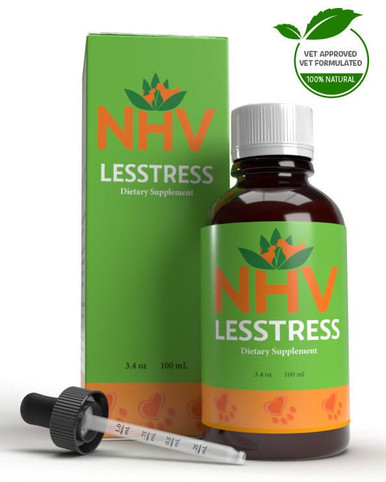
Everyone knows what stress feels like, and we all know that too much stress can make us ill—high blood pressure, ulcers and even cancer can result from excessive stress. Like us, dogs can get stressed by numerous factors as well. Help your furkiddo relax into a long and happy life with NHV Lesstress - a natural dog stress support.

Natural Dog Stress Reliever Supplemental Support
With a heightened sense of hearing and smell, small events that seem mundane to us can be terrifying and stressful for your dogs. Sometimes the stress is from the ride to the office, or maybe they are missing their human companions. This all contributes to changes in behavior like excessive panting, drooling, sweaty paws, dilated eyes, pacing, excessively shedding, or just completely shutting down. Some dogs become so stressed that it may lead to fear and aggression.
Other forms of stress in a dog’s life include:
In addition to panting, excessive barking/whining, chewing on themselves, shivering (when it’s not cold), panicked tail wagging, or tense muscles, stress can also cause GI tract issues such as diarrhea or vomiting.
The key to a healthy pup is balance. Too much or too little activity can be harmful, as well as too much or too little socialization. A balanced, clean diet also helps maintain the body and the mind. If your dog is susceptible to stress, you can use calming herbs like those found in NHV Lesstress. This formulation gently acts on the nervous system and immune system to provide a natural dog stress reliever.
How NHV’s Natural Dog Stress Relief Eases Stress and Anxiety
For stressful experiences such as separation anxiety, the loss or addition of a furry friend, special events (eg. fireworks) and illness (stress can cause conditions to worsen), the natural (non-addictive) sedative properties of Lesstress gently relax the nervous system and endocrine system. Ingredients like Chamomile, Passion Flower and Lemon Balm work to calm nerves while ingredients like Reishi, Eleuthero, and Echinacea Angustifolia are very beneficial for helping the body adapt to stress and illness and stimulate healthy immune function.
Help Support Your Dog Naturally
All NHV supplements like Lesstress are 100% natural and created by a holistic veterinarian and a master herbalist, specially formulated for pets. Feel free to contact our veterinary professionals to get more insight into your little one’s health and wellbeing.
Made with the finest, organically grown, or ethically harvested herbs. Made specifically for pets, vet-formulated and vet approved.
Lesstress for Dogs
Select your pet's weight to determine the correct dose.
To be taken twice daily. Determine your pet’s weight and then use the easy chart below to determine the correct dose. This is the minimum dosage.
Pet's Weight Dosage
0 - 15 lb = 0.5 ml
16 - 30 lb = 1.0 ml
31 - 45 lb = 1.5 ml
46 - 60 lb = 2.0 ml
61 - 75 lb = 2.5 ml
Over 75 lb = 3.0 ml
For small animals (rabbits, ferrets), avians and reptiles use 1 drop for every 2 lb of body weight.
How to Administer
Shake well before use.
The easiest method is to use the dropper provide and places the drops into your pet’s food or favorite treat. You can also use the dropper and squirt directly into the pet’s mouth.
Some pets can be finicky, if this occurs consider hiding the drops in foods most pet’s love such as fish, chicken or yogurt or a favourite treat. If your pet only eats dry food then soak a few kibbles at feeding time.
For Best Results
Herbal dietary supplements are beneficial to the health and wellbeing of your pet and are safe for long-term use. Every pet responds to natural herbal supplements differently, therefore it is important to be consistent and administer the product daily. Supplements generally take two to four weeks to take effect, however this will vary from one animal to the next.
Product Storage
All NHV Natural Pet Products are pure herbal extracts and contain no artificial additives, preservatives or coloring. Shelf life after opening is 6 months and must be refrigerated after opening.
Cautions and Contraindications
Do not use Lesstress in pregnant or nursing animals.
Speak to your vet before using our products. A second visit is recommended if your pet’s condition does not improve, or deteriorates after continued use of the supplements.
All information provided by NHV Natural Pet Products is for educational purposes only.
Natural Dog Stress Reliever Supplemental Support
With a heightened sense of hearing and smell, small events that seem mundane to us can be terrifying and stressful for your dogs. Sometimes the stress is from the ride to the office, or maybe they are missing their human companions. This all contributes to changes in behavior like excessive panting, drooling, sweaty paws, dilated eyes, pacing, excessively shedding, or just completely shutting down. Some dogs become so stressed that it may lead to fear and aggression.
Other forms of stress in a dog’s life include:
In addition to panting, excessive barking/whining, chewing on themselves, shivering (when it’s not cold), panicked tail wagging, or tense muscles, stress can also cause GI tract issues such as diarrhea or vomiting.
The key to a healthy pup is balance. Too much or too little activity can be harmful, as well as too much or too little socialization. A balanced, clean diet also helps maintain the body and the mind. If your dog is susceptible to stress, you can use calming herbs like those found in NHV Lesstress. This formulation gently acts on the nervous system and immune system to provide a natural dog stress reliever.
How NHV’s Natural Dog Stress Relief Eases Stress and Anxiety
For stressful experiences such as separation anxiety, the loss or addition of a furry friend, special events (eg. fireworks) and illness (stress can cause conditions to worsen), the natural (non-addictive) sedative properties of Lesstress gently relax the nervous system and endocrine system. Ingredients like Chamomile, Passion Flower and Lemon Balm work to calm nerves while ingredients like Reishi, Eleuthero, and Echinacea Angustifolia are very beneficial for helping the body adapt to stress and illness and stimulate healthy immune function.
Help Support Your Dog Naturally
All NHV supplements like Lesstress are 100% natural and created by a holistic veterinarian and a master herbalist, specially formulated for pets. Feel free to contact our veterinary professionals to get more insight into your little one’s health and wellbeing.
Made with the finest, organically grown, or ethically harvested herbs. Made specifically for pets, vet-formulated and vet approved.
Lesstress for Dogs
Select your pet's weight to determine the correct dose.
To be taken twice daily. Determine your pet’s weight and then use the easy chart below to determine the correct dose. This is the minimum dosage.
Pet's Weight Dosage
0 - 15 lb = 0.5 ml
16 - 30 lb = 1.0 ml
31 - 45 lb = 1.5 ml
46 - 60 lb = 2.0 ml
61 - 75 lb = 2.5 ml
Over 75 lb = 3.0 ml
For small animals (rabbits, ferrets), avians and reptiles use 1 drop for every 2 lb of body weight.
How to Administer
Shake well before use.
The easiest method is to use the dropper provide and places the drops into your pet’s food or favorite treat. You can also use the dropper and squirt directly into the pet’s mouth.
Some pets can be finicky, if this occurs consider hiding the drops in foods most pet’s love such as fish, chicken or yogurt or a favourite treat. If your pet only eats dry food then soak a few kibbles at feeding time.
For Best Results
Herbal dietary supplements are beneficial to the health and wellbeing of your pet and are safe for long-term use. Every pet responds to natural herbal supplements differently, therefore it is important to be consistent and administer the product daily. Supplements generally take two to four weeks to take effect, however this will vary from one animal to the next.
Product Storage
All NHV Natural Pet Products are pure herbal extracts and contain no artificial additives, preservatives or coloring. Shelf life after opening is 6 months and must be refrigerated after opening.
Cautions and Contraindications
Do not use Lesstress in pregnant or nursing animals.
Speak to your vet before using our products. A second visit is recommended if your pet’s condition does not improve, or deteriorates after continued use of the supplements.
All information provided by NHV Natural Pet Products is for educational purposes only.
travel support
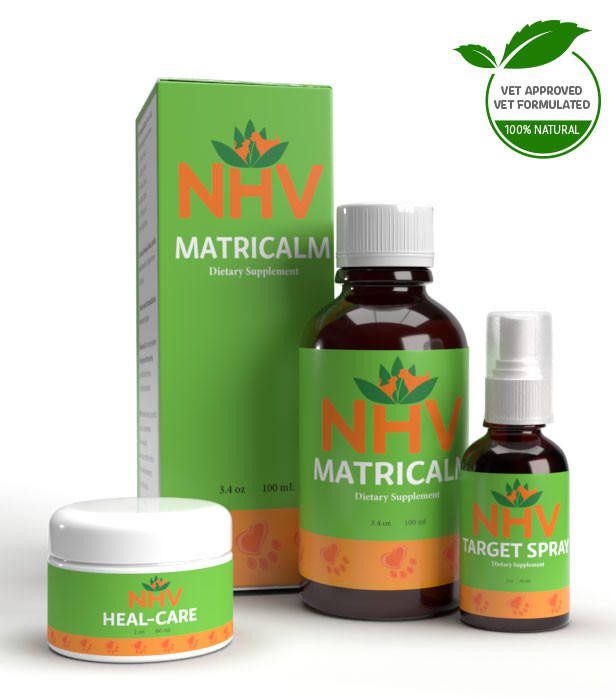
Matricalm, Heal Care Ointment, Target Spray
bundle and save with pet expert kits
3 month supply for a small to medium size
Our Travel Essentials kit includes products essential for the travelling pet. Keep your pet calm, free of fleas, ticks and mosquitos and soothe damaged or burnt skin
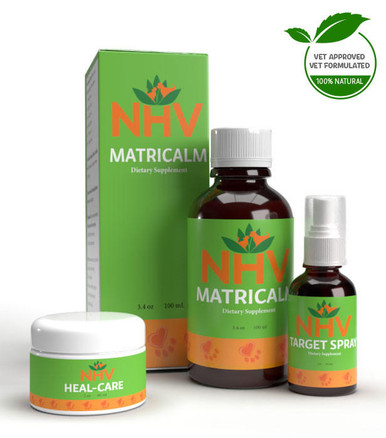
Our Travel Essentials kit includes products essential for the travelling pet. Keep your pet calm, free of fleas, ticks and mosquitos and soothe damaged or burnt skin
Help reduce aggression and anxiety in your pet with Matricalm, a natural herbal product designed to help reduce excitability in your pet. Pets can become anxious or aggressive when exposed to other animals or to people they are unfamiliar with. Separation from an owner or a move to a new home can also trigger troubling symptoms of anxiety
Safely rid your pet of insects and their eggs. Target Spray helps your pet rid itself of fleas, ticks, lice, and mosquitoes. Its soothing herbal formulation keeps insects away and calms skin irritated by the inevitable scratching bugs cause. Fleas are tiny, wingless insects that feed on your pet’s body by sucking blood. They can transmit disease, cause skin allergies, anemia, and generally irritate your pet. Many pets are allergic to flea saliva, which causes them to lick, chew, scratch, and rub the irritated area. This can often result in hair loss and secondary infections.
Many pets are busy animals prone to paw or skin injuries including bruising, sprains, cuts, wounds, burns and infections. Signs of injury are easy to spot and include obvious discomfort, limping, red and swollen pads, and a general reluctance to walk or run. Heal Care Ointment is a topical ointment designed to soothe and heal injured paws and skin.
MATRICALM
Chamomile – Contains sedative properties.
Passion Flower – An effective, non-addictive sedative.
Lemon Balm – An aromatic herb used for nervous disorders, excitability, and anxiety.
Valerian – Stops heart palpitations, relaxes spasms, relieves discomfort, and regulates the nervous system.
Hops – Eases tension and anxiety in pets.
HEAL CARE OINTMENT
Arnica – Relieves discomfort and inflammation, clears fungal and bacterial infections, and stimulates the immune system.
St. John’s Wort – Reduces inflammation, promotes healing, and acts as an antiseptic and analgesic.
TARGET SPRAY
Lavender – Contains volatile oils of low toxicity and tannins with antiseptic and insect deterrent action.
Rosemary – Rich in essential oils. Also has antiseptic, astringent, and anti-inflammatory properties.
Sweet-Scented Marigold – An effective insect deterrent that also helps eliminate ticks.
Neem – An effective insect deterrent that helps eliminate parasites and has significant healing properties.
European Pennyroyal – An insect deterrent that also soothes itchy skin.
Aloe Vera – Soothes and cools irritated skin.
Celandine –Protects the liver and can help against microorganisms.
Milk Thistle – Protects the liver from toxins.
Lemongrass Oil – An effective insect deterrent that contains essential oils.
Ceylon Citronella Oil – An insect deterrent that contains antiviral and antibacterial properties.
Tea Tree Oil – An effective antiseptic useful in the treatment of wounds and bites.
Select your pet's weight to determine the correct dose.
DOSAGE FOR MATRICALM
To be taken twice daily. Determine your pet’s weight and then use the easy chart below to determine the correct dose. This is the minimum dosage.
Pet's Weight Dosage
0 - 15 lb = 0.5 ml
16 - 30 lb = 1.0 ml
31 - 45 lb = 1.5 ml
46 - 60 lb = 2.0 ml
61 - 75 lb = 2.5 ml
Over 75 lb = 3.0 ml
For small animals (rabbits, ferrets), avians and reptiles use 1 drop for every 2 lb of body weight.
How to Administer
Shake well before use. The easiest method is to use the dropper provided and place the drops into your pet’s food or favorite treat. You can also use the dropper and squirt directly into the pet’s mouth. Some pets can be finicky, if this occurs consider hiding the drops in foods most pet’s love such as fish, chicken or yogurt or a favorite treat. If your pet only eats dry food then soak a few kibbles at feeding time.
For Best Results
Herbal dietary supplements are beneficial to the health and well-being of your pet and are safe for long-term use. Every pet responds to natural herbal supplements differently, therefore it is important to be consistent and administer the product daily. Supplements generally take two to four weeks to take effect, however this will vary from one animal to the next.
Product Storage
All NHV Natural Pet Products are pure herbal extracts and contain no artificial additives, preservatives or coloring. Shelf life after opening is 6 months and must be refrigerated after opening.
Cautions and Contraindications
Do not use in pregnant or nursing animals.
All information provided by NHV Natural Pet Products is for educational purposes only.
TARGET SPRAY
How to Administer
Topical Spray: Spray several times a day as need. It may some times be necessary to shave or trim your pet’s hair so that the Target spray reaches the affected area.
Caution
Do not spray near or into eyes or nose. Do not use in pregnant animals.
HEAL CARE OINTMENT
How to Administer
Topical ointment: Clean and dry paw pads. Apply to affected area 3 to 4 times per day until healed. It may be necessary to use booties or wrap the paw with gauze dressing so that your pet does not lick the ointment.
Caution
Do not apply on open or bleeding wounds. Heal Care ointment contains arnica which may cause a skin allergy on some very sensitive pet’s. Try the product on a hairless part of the body first to test for sensitivity
Help reduce aggression and anxiety in your pet with Matricalm, a natural herbal product designed to help reduce excitability in your pet. Pets can become anxious or aggressive when exposed to other animals or to people they are unfamiliar with. Separation from an owner or a move to a new home can also trigger troubling symptoms of anxiety
Safely rid your pet of insects and their eggs. Target Spray helps your pet rid itself of fleas, ticks, lice, and mosquitoes. Its soothing herbal formulation keeps insects away and calms skin irritated by the inevitable scratching bugs cause. Fleas are tiny, wingless insects that feed on your pet’s body by sucking blood. They can transmit disease, cause skin allergies, anemia, and generally irritate your pet. Many pets are allergic to flea saliva, which causes them to lick, chew, scratch, and rub the irritated area. This can often result in hair loss and secondary infections.
Many pets are busy animals prone to paw or skin injuries including bruising, sprains, cuts, wounds, burns and infections. Signs of injury are easy to spot and include obvious discomfort, limping, red and swollen pads, and a general reluctance to walk or run. Heal Care Ointment is a topical ointment designed to soothe and heal injured paws and skin.
MATRICALM
Chamomile – Contains sedative properties.
Passion Flower – An effective, non-addictive sedative.
Lemon Balm – An aromatic herb used for nervous disorders, excitability, and anxiety.
Valerian – Stops heart palpitations, relaxes spasms, relieves discomfort, and regulates the nervous system.
Hops – Eases tension and anxiety in pets.
HEAL CARE OINTMENT
Arnica – Relieves discomfort and inflammation, clears fungal and bacterial infections, and stimulates the immune system.
St. John’s Wort – Reduces inflammation, promotes healing, and acts as an antiseptic and analgesic.
TARGET SPRAY
Lavender – Contains volatile oils of low toxicity and tannins with antiseptic and insect deterrent action.
Rosemary – Rich in essential oils. Also has antiseptic, astringent, and anti-inflammatory properties.
Sweet-Scented Marigold – An effective insect deterrent that also helps eliminate ticks.
Neem – An effective insect deterrent that helps eliminate parasites and has significant healing properties.
European Pennyroyal – An insect deterrent that also soothes itchy skin.
Aloe Vera – Soothes and cools irritated skin.
Celandine –Protects the liver and can help against microorganisms.
Milk Thistle – Protects the liver from toxins.
Lemongrass Oil – An effective insect deterrent that contains essential oils.
Ceylon Citronella Oil – An insect deterrent that contains antiviral and antibacterial properties.
Tea Tree Oil – An effective antiseptic useful in the treatment of wounds and bites.
Select your pet's weight to determine the correct dose.
DOSAGE FOR MATRICALM
To be taken twice daily. Determine your pet’s weight and then use the easy chart below to determine the correct dose. This is the minimum dosage.
Pet's Weight Dosage
0 - 15 lb = 0.5 ml
16 - 30 lb = 1.0 ml
31 - 45 lb = 1.5 ml
46 - 60 lb = 2.0 ml
61 - 75 lb = 2.5 ml
Over 75 lb = 3.0 ml
For small animals (rabbits, ferrets), avians and reptiles use 1 drop for every 2 lb of body weight.
How to Administer
Shake well before use. The easiest method is to use the dropper provided and place the drops into your pet’s food or favorite treat. You can also use the dropper and squirt directly into the pet’s mouth. Some pets can be finicky, if this occurs consider hiding the drops in foods most pet’s love such as fish, chicken or yogurt or a favorite treat. If your pet only eats dry food then soak a few kibbles at feeding time.
For Best Results
Herbal dietary supplements are beneficial to the health and well-being of your pet and are safe for long-term use. Every pet responds to natural herbal supplements differently, therefore it is important to be consistent and administer the product daily. Supplements generally take two to four weeks to take effect, however this will vary from one animal to the next.
Product Storage
All NHV Natural Pet Products are pure herbal extracts and contain no artificial additives, preservatives or coloring. Shelf life after opening is 6 months and must be refrigerated after opening.
Cautions and Contraindications
Do not use in pregnant or nursing animals.
All information provided by NHV Natural Pet Products is for educational purposes only.
TARGET SPRAY
How to Administer
Topical Spray: Spray several times a day as need. It may some times be necessary to shave or trim your pet’s hair so that the Target spray reaches the affected area.
Caution
Do not spray near or into eyes or nose. Do not use in pregnant animals.
HEAL CARE OINTMENT
How to Administer
Topical ointment: Clean and dry paw pads. Apply to affected area 3 to 4 times per day until healed. It may be necessary to use booties or wrap the paw with gauze dressing so that your pet does not lick the ointment.
Caution
Do not apply on open or bleeding wounds. Heal Care ointment contains arnica which may cause a skin allergy on some very sensitive pet’s. Try the product on a hairless part of the body first to test for sensitivity
Published: May 11, 2022